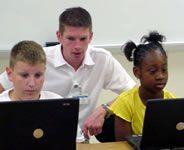 Reflection is an important activity for learners. How often do you think
about what you have experienced, what you have learned?
Reflection is an important activity for learners. How often do you think
about what you have experienced, what you have learned?
As lifelong learners, library media professionals should continuously reflect on our professional skills and approaches. It helps us to make sense of what has occurred.
What is reflection? It is a process by which learners think critically about their experiences. It can occur through writing, speaking, listening, and reading about the experiences. Learning happens in a mix of theory and practice, thought and action, observation and interaction.
Start with a few basic questions to guide this review
- What? What do you think about it?
- So What? How do you feel about it?
- Now What? What will you do?
Example:
- What? Yesterday I finished a month-long
project with Ms. Samuelson and her psychology course.
Students read a biography on a person of interest, then created a psychological
profile of this person using a variety of resources.
- What worked. The "people power" center we set up in the library really worked great. Students were really drawn to the photographs and resources. Even students in other classes were interested.
- What didn't work. We didn't do as much teaming as we'd planned. Most of our collaboration took place before the unit started and we didn't spend much time actually "team teaching" as we'd hoped.
- So What? I really feel great about the project as a whole, but there were a few specific problems that caused headaches. I think if we could address these problems, Ms. Samuelson would be receptive to replicating this project next semester.
- Now What? There are a few specific
things I need to address now, so we will be ready for next time.
- ASAP. We really need a place where students can easily upload their projects to the school web server. Student didn't have any trouble using Word or PowerPoint, but they got frustrated when it was time to upload their projects to the server. I need to contact the tech people to get this set up. Then, create a handout so it's ready for the next time.
- ASAP. I've got a bunch of notes about websites, books, and other resources that would help students in identifying their person, locating biographies, and finding primary resources. I need to create a web-based pathfinder to use when this course is taught again in the spring.
- Next Time. We need to plan a few specific joint activities Ms. Samuelson and I can do together. Maybe we could do something this using electronic databases to identify psychological profile information.
These reflective questions assist in identifying and understanding new information, help us fit this to what we already know, and lead to using our new learning in new and different situations.
The stages of a deeper approach to learning involving the reflective / review process were identified (Moon, J.,1999, Reflection in Learning and Professional Development: Theory and Practice. London; Kogan, p6):
- Noticing - observing what has occurred
- Making sense - knowing / fitting the facts together
- Making meaning - putting into context(s)
- Working with meaning - linking to other ideas
- Transforming learning - restructure ideas and understandings
Reflection is the key to getting meaning from an experience. It allows students to learn from themselves. It is not a "one time" activity. Instead, reflection is an ongoing, metacognitive activity focusing on your evolving perspectives.
Check Your Understanding
Keep a professional journal reflecting on your professional skills. Consider each of the following areas:
- professional roles
- leadership/management styles
- operations/services/functions
- collaborations
- personnel management
- staff development
- budgeting
- grant writing
- promotion
- facilities design
- evaluation
Make It Real
It's never too early to become active in professional organizations. You can begin by participating in one of the following activities:
- Attend the AIME conference.
- Volunteer at the AIME conference.
- Volunteer as a judge for media fair. Occurs in the spring.
- Attend the ICE conference.
- Attend a National conference. Go the AECT, ALA, AASL, or NECC conference pages for more information.
You are near competing this course. If you have not already done so, began to think of yourself as a school library media specialist. You are one. Now what are the next step(s)?
Reflect on your professional practice:
- professional strengths and weaknesses
- professional likes and dislikes
- career goals and aspirations
Develop a professional plan.
Read More About It
Electronic Portfolios: Students, Teachers, and Life Long Learners from
eduScapes Teacher Tap
http://eduscapes.com/tap/topic82.htm
Exploring Reflection and Learning (http://www.infed.org/foundations/w-inf4.htm) from The Encyclopaedia of Informal Education
Reflection http://www.trainer.org.uk/members/theory/process/reflection.htm
Website provides several definitions from the literature of reflection.
Swenson, D.X. (Jan. 1999). The Reflective Practitioner: Foundation of Teamwork & Leadership http://www.css.edu/users/dswenson/web/TWAssoc/reflectivepractitioner.html